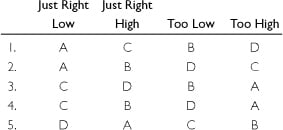1. Part I: Your Stress Tolerance Point Analysis
Circle your answers in the following chart, and then determine in which column you had the most answers:
“Your stress tolerance point indicates how much stress you can take.”

Your
stress tolerance point indicates how much stress you can take. If your
answers fell about equally in more than one category, that probably
means you can take lots of stress when it comes to certain things and
less when it comes to other things, or that some parts of your life are
too high in stress and others are just right or even too low. Read on to
learn what your stress tolerance point score indicates.
2. If You Scored “Just Right Low”
If you scored
the most points under JUST RIGHT LOW, you don’t tolerate too much
stress, but you are already good at taking measures to limit the stress
in your life. You perform best and feel happiest when your routine runs
smoothly. You can deal with stressful situations for short periods of
time, but you are always thrilled to get home after a vacation, and you
are very attached to your daily, weekly, monthly, and annual rituals.
You’ve
crafted a routine that works for you, and when events throw off your
routine, you tend to experience stress. Having recognized your low
stress tolerance, however, you’ve already got the tools in place for
keeping your life low-key and systematic whenever possible. Maybe you
are good at saying “no” to things you don’t have room for in your life.
The
coping skills you need to cultivate are the techniques that will help
you deal with those inevitable times when life changes dramatically or
when you aren’t able to stick to your routine due to circumstances
beyond your control. Long-term or permanent changes will require you to
make your routine flexible enough to accommodate new circumstances,
either temporarily or permanently. Short-term changes may require a
temporary suspension of your beloved routine.
3. If You Scored “Just Right High”
If you scored
the most points under JUST RIGHT HIGH, you can take a fairly high level
of stress, and you actually like life a bit more exciting. You are
probably an easygoing person who enjoys seeing what lies around the next
bend in life, and strict schedules bore you. You’ve designed your
life—whether consciously or not—around keeping yourself happily
stimulated. You know you like things to be interesting, so you resist
routines and let just enough stress into your life to keep you humming
along efficiently.
Of
course, not all change is pleasant, and the stress management
techniques you can successfully master are those that help you deal with
the less pleasant changes life sometimes has to offer—for example,
illness, injury, loss of a loved one. Even you can’t go with the flow all the
time. You may also find it difficult to sit still and concentrate.
Meditation and other techniques that cultivate inner as well as outer
stillness can be of great benefit to you; they can teach you
self-discipline and the skill of slowing down once in a while.
4. If You Scored “Too Low”
If you scored
the most points under TOO LOW, you probably have a very high stress
tolerance point and you are operating well below it. Or, maybe, your
stress tolerance is relatively low, but you are still operating
below it. Your peak of functioning and happiness is best reached under
more stimulation than you are currently experiencing. Maybe your life is
necessarily highly routine and you can’t stand it. You long for
excitement and change.
Not
meeting your stress tolerance point can result in frustration,
irritation, aggression, and depression. But you can do something about
it! Afraid to change jobs? Make saving a nest egg an active goal, then
take the plunge. If you feel your marriage is stagnating, don’t go out
and have an affair but find a counselor who can help you add excitement
and vigor to your relationship. Stress management techniques can help
you, too. Ironically, not having enough stress to meet your own stress
tolerance point is stressful. Meet
your needs with interesting, positive changes and handle your
frustration, aggression, or depression with stress management
techniques.
5. If You Scored “Too High”
If
you scored TOO HIGH, you probably know all too well that you are
operating well above a healthy stress tolerance level. You are probably
also suffering from some of the ill effects of stress, such as frequent
minor illness, inability to concentrate, anxiety, depression, or
self-neglect. You may often feel like your life is out of control or
your situation is hopeless.